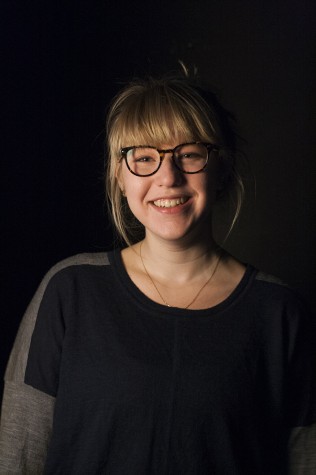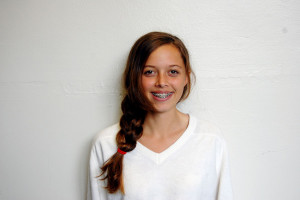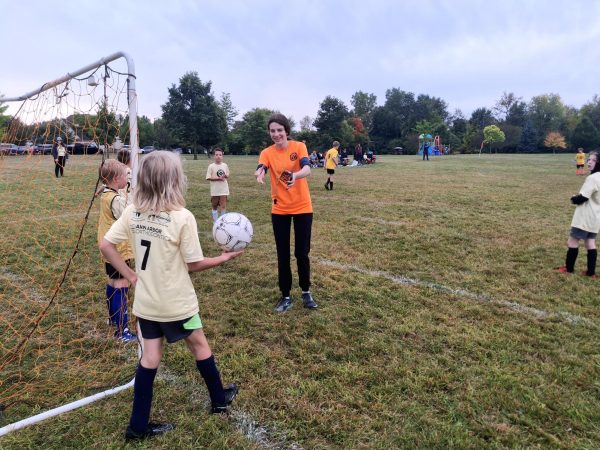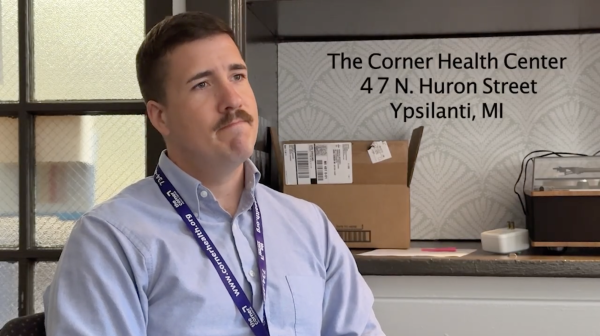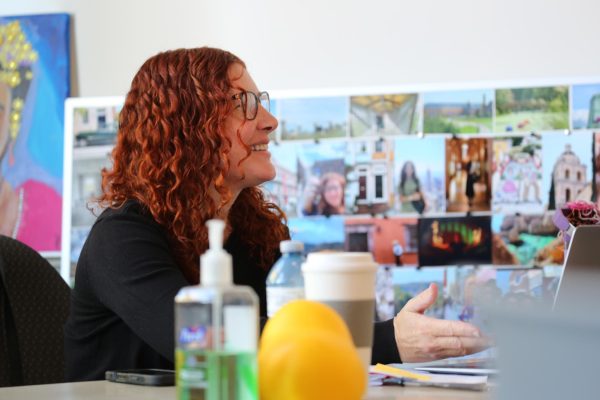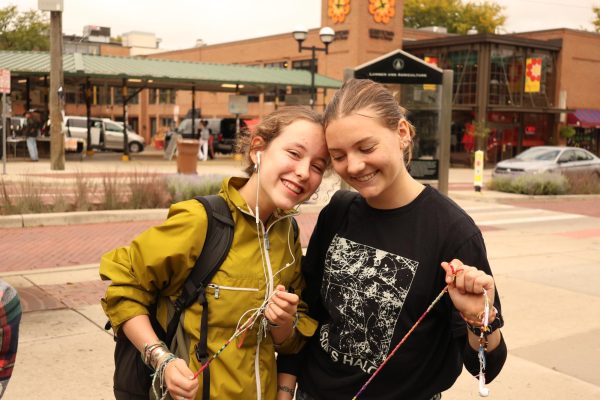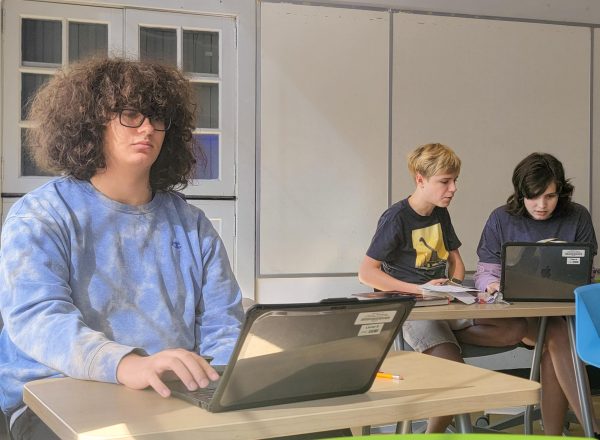A Life Story: Irene Butter
History is being made as we speak, but at the same time, history is also disappearing. Irene Butter tells a story that is touching and true about her survival during the Holocaust. Butter is one of the few Holocaust survivors alive today, and has lived her life making her story known.
“I was born in Berlin, Germany,” said Butter. Her father was a partner in a bank, but once Hitler started persecuting the Jews, they weren’t allowed to own banks anymore. Her family of four left for the Netherlands, hoping that it would be safe.
They had two peaceful years until the Nazis invaded the Netherlands. Butter, along with her family, was then transferred to her first concentration camp in Holland. The camp was very crowded and unhygienic. Butter lived in barracks and slept in steel framed bunk beds, three beds stacked on top of each other. During the day adults had to work, but for children like Butter there was nothing to do. “There was no school; we didn’t have any toys or anything. When we were arrested in Holland they gave us ten minutes to take whatever we wanted to take with us, and we could only take what we could carry.”
The hardest part for Butter was on Monday nights when the barrack leaders would come at midnight and turn on the lights. They would then read a list of people that had to go on the train in the morning to Auschwitz and other death camps. “First you had the trauma of listening to all of the names of the people who were going on the train, and if your name wasn’t called, then you went to go visit your friends and family in other barracks to see if they had to go. There was always someone, and we would spend the rest of the night with people, and of course you knew you would never see them again.”
After about eight months in their first concentration camp, Butter and her family obtained fake passports claiming them as citizens of Ecuador, meaning they were much less likely to be sent to Auschwitz and other death camps. “It put you in a special category. So on the one hand, you’re very lucky, you’re fortunate, you’re thankful, but on the other hand, every week, more people had to go,” said Butter. “They told us that we were going to be sent to a better camp, because of these passports, a privileged camp… but in fact, when we arrived in Bergen-Belsen, we could tell right away that this was a pretty dismal camp, and much worse than where we had come from.”
When they arrived in Bergen-Belsen, the conditions worsened. The camp was more crowded and the adults had to do hard labor seven days a week, working in factories, doing construction, or digging trenches. Everyone lost weight because the food rations were limited to a small piece of bread and a bowl of soup at night, which was mainly water and turnips. “If you were lucky, you found a little piece of potato in it,” said Butter. As well as minimal food supplies, there were also epidemics. The camp was so crowded, there was one bed for two people, so the epidemics were running wild. “Every morning you would wake up and look around and see how many people had died during the night. Every single morning you’d wake up and people were dead around you.”
The worst part of this camp was the role call. Everyday, people who didn’t go to work would line up in rows of five. They couldn’t move, they couldn’t sit, they couldn’t talk, they couldn’t do anything. “The Nazis were always there with their guns, and if you did anything, they could beat you up. That role call, it could take two hours, or it could take five, or six, or seven, just whatever they felt like,” Butter said. If the number was not right, they would have to just stand.
Although this camp was not liberated until April of 1945, Butter and her family were able to leave by the end of January. They were scheduled to take a train to Switzerland, a neutral country, but by this time, Butter’s mother was very sick. “She hadn’t been out of bed for months and we didn’t even know how we would get her to the train, but some friends helped carry her.” said Butter. “[The] second night on the train, my father died… still hard after all those years.” Butter said with tears in her eyes.
When they arrived in Switzerland, they were far from welcomed. “They didn’t want to keep us. First of all, the way we looked, they had never seen any human beings like that, we were in rags… We carried all these diseases, so people didn’t even want to come near us,” explains Butter. Because Switzerland was a neutral country, they did not want to keep refugees there. “I was then sent to a displaced persons camp in Algiers, in North Africa, by myself… My mother was very critically ill, and my brother also needed hospitalization, so they were hospitalized in Switzerland. The Swiss wouldn’t let me stay with them… And that was really difficult, you know, to be separated.”
In the camp there were many people, “Some displaced persons wanted to go back to the country where they had lived, but others, [such as] my family certainly didn’t want to go back to Germany. So then you’re displaced, because you have to find another place to go to, now who will accept you?” said Butter. Butter and her family were lucky: they had relatives in America that sponsored them. Butter was the first of her family to go to America. “I just turned 15 on the ship; I arrived in America on a Liberty Ship. They built them during the war, they put them together in 24 hours, mostly to transport cargo and soldiers, so they weren’t really made for passengers.” The harbor was too frozen to dock the ship, so Butter was taken to Baltimore in a lifeboat.
After her three week voyage, Butter arrived on Christmas Eve. She stayed with relatives until her mother and brother came six months later. She called them Uncle and Aunt and had a cousin who was 4 years older than her. “They were wonderful to share everything with me, they were like my parents,” explained Butter.
“I went to school immediately after I arrived, I hadn’t had any schooling for three and a half years, and I was really eager… I went to high school, then I went to college in New York City, Queens college. My mother and brother came and we were stateless, because we didn’t have any citizenship, we were homeless because we didn’t have a home, and we were penniless because we didn’t have anything. Still, I was able to go to college,” said Butter.
When Butter and brother were not in school, they were working. “I had jobs in the afternoon and evening. My brother had a job in the daytime and went to school at night. He finished high school and then college. My mother had never worked before, so she had to do unskilled jobs. It was a difficult time, but never the less, I had a scholarship, and I went to a city college, where there was no tuition… After I graduated from college I went to Duke University and got my Ph.D. So it’s still the land of opportunity, the things you can do without resources in this country,” said Butter.
“Well, I feel that I’ve had a very good life, a rich life and rewarding life and I’ve always been grateful to have survived,” Butter said in the end. To say “I’ve had a very good life,” after all the struggles that she has been through shows what a strong, courageous person she is. This is a woman who never gave up, and even when she was out of trouble, she helped others. This is Irene Butter, Holocaust survivor.
